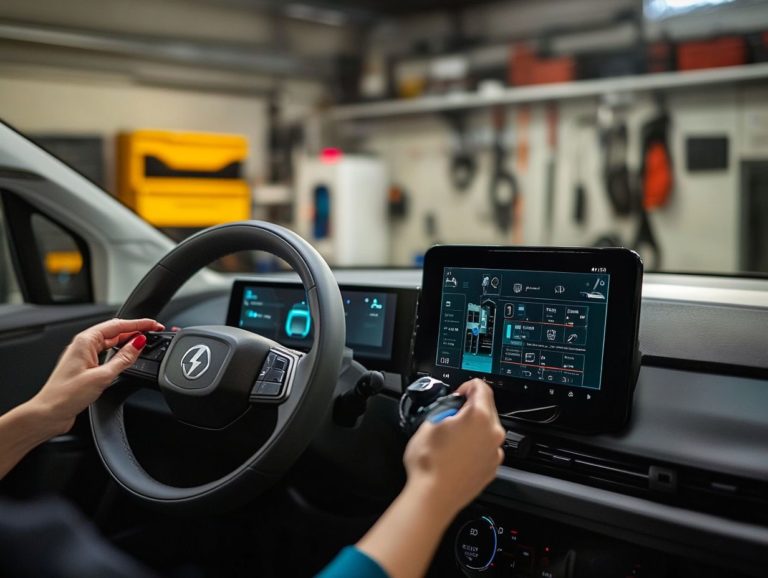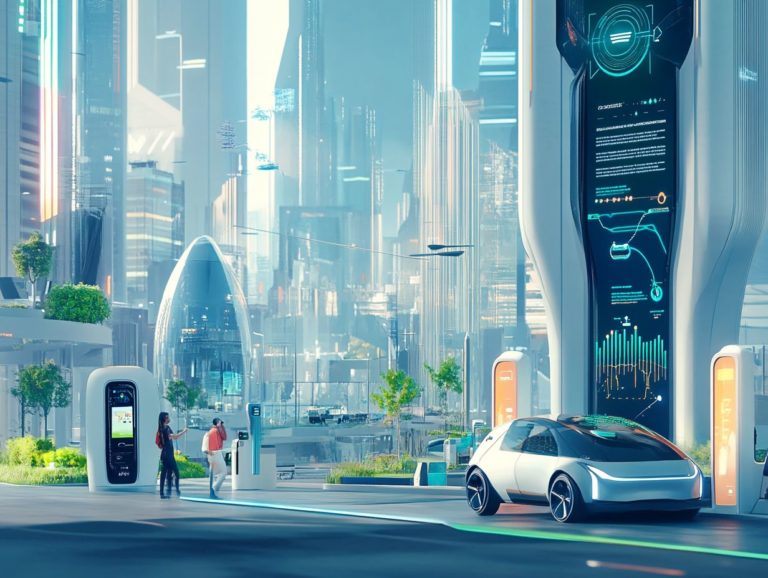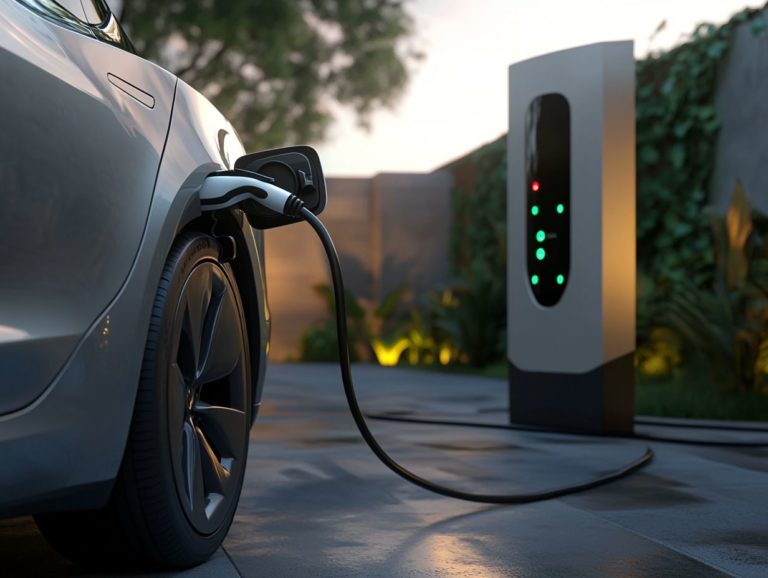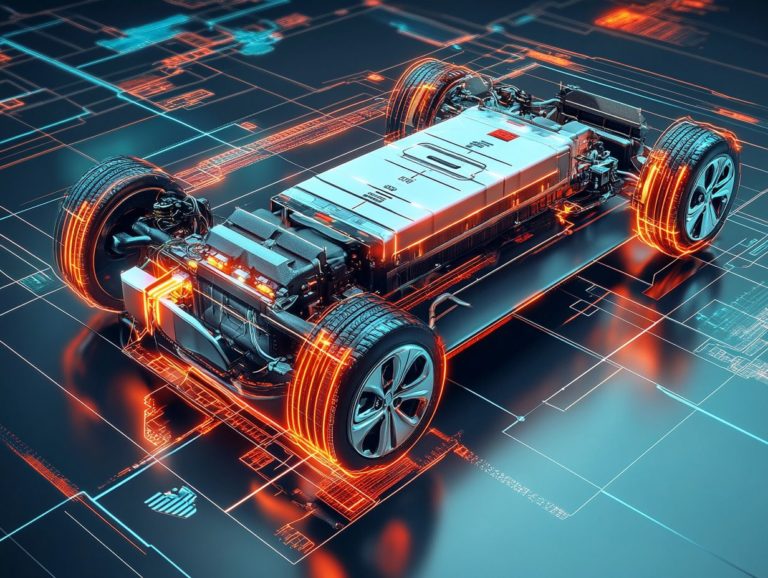54. understanding the cost of electric vehicle ownership
Electric vehicles (EVs) are quickly becoming the preferred choice for those looking for a sustainable alternative to traditional gasoline cars. You may still be wondering about the true cost of owning one.
This article will guide you through the factors that influence your EV expenses. We ll cover initial purchase prices, maintenance costs, charging options, and government incentives. We will also compare the long-term financial benefits of EVs with gasoline vehicles.
By the end, you ll have a clearer understanding of why investing in an electric vehicle might be a savvy decision for both your finances and the planet.
Contents
Key Takeaways:

- Electric vehicles have lower maintenance and repair costs.
- Government incentives can lower your initial purchase price.
- Proper maintenance and efficient charging save you money.
What are Electric Vehicles?
Electric vehicles (EVs) mark a revolutionary shift in the automotive landscape, offering a sustainable and efficient alternative to traditional gasoline engines. As your interest in EV ownership grows, it’s essential to delve into the distinctive features of electric vehicles, their technological advancements, and the myriad benefits they bring compared to traditional gasoline vehicles.
This transformation in the market mirrors a broader societal movement toward cleaner energy sources and lower emissions. These vehicles operate on electric power, using batteries that store energy for propulsion, which significantly cuts down on greenhouse gas emissions.
You ll encounter various types of EVs, including:
- Battery electric vehicles (BEVs)
- Plug-in hybrid electric vehicles (PHEVs)
- Fuel cell electric vehicles (FCEVs)
Each type contributes to environmental sustainability in its unique way. The growing network of charging stations enhances accessibility and convenience, making it easier for you to embrace this change. Government incentives and rebates also encourage electric vehicle adoption, making them more affordable and enticing.
This collective push toward sustainability highlights a commitment to innovative transportation solutions that resonate with your environmental aspirations.
Why Consider Electric Vehicles?
Thinking about making the switch to an electric vehicle? You re not alone in wanting to reduce your environmental impact while saving money! Considering an electric vehicle opens up a world of advantages, especially for those who aim to reduce their environmental footprint while reaping significant savings on maintenance and fuel costs.
As concerns about the climate crisis and soaring gas prices grow louder, electric vehicles stand out as a practical solution, often bolstered by government incentives that enhance their financial accessibility. The reduced depreciation value of electric vehicles further enhances their long-term appeal, positioning them as a savvy financial investment.
You can also enjoy the convenience of installing a home charger, which simplifies your fueling process and leads to additional savings. Moreover, the minimal upkeep these vehicles require means you face fewer repairs or component replacements, translating into even more savings over time.
By embracing an electric vehicle, you re not only playing a role in fostering a sustainable future but also navigating the rising costs associated with traditional vehicles with much greater ease.
Factors Affecting the Cost of Electric Vehicle Ownership

Understanding how to compare electric vehicle ownership costs is crucial for you as a buyer, as these factors greatly influence your total investment.
Key considerations include:
- The initial purchase price
- Ongoing maintenance and repair costs
- Fuel expenses compared to traditional gas-powered cars
- Insurance premiums
- Depreciation over time
By assessing these factors, you can make smart decisions that fit your investment goals in the electric vehicle market.
Initial Purchase Price
The initial price of electric vehicles varies based on model, manufacturer, and market trends. Resources like Kelley Blue Book highlight this variability.
This price is a key factor for potential EV owners as it forms the basis of your financial commitment, especially when understanding the cost of home EV charging.
When comparing costs, consider brand reputation and the features that come with each vehicle. Many buyers factor in possible government incentives, which can lower the effective price.
Financing options make electric vehicles more accessible, easing concerns about upfront costs.
Many manufacturers offer attractive leasing options, making your switch to electric easier, especially with the long-term savings on fuel and maintenance.
Maintenance and Repair Costs
Electric vehicles have significantly lower maintenance and repair costs than traditional gas-powered cars. This is because EVs have fewer moving parts, which means fewer maintenance needs.
According to the Smart Energy Consumer Collaborative, EVs usually require less frequent servicing since they lack oil filters and exhaust systems found in gas cars.
Reports from AAA show that while battery replacements can be expensive, overall maintenance costs are much lower over time.
You ll find that regular repairs for components like brakes and transmissions are nearly non-existent. The streamlined design of EVs leads to a more cost-effective ownership experience.
Charging Costs

Charging costs play a big role in your EV ownership experience. To better understand these expenses, it’s helpful to learn how to prepare for electric vehicle ownership, as they significantly impact overall expenses compared to fueling traditional gas-powered vehicles.
With more charging stations available, consider your options for home and public charging to manage costs effectively.
Investing in a Level 2 charger for home charging is often more convenient and economical. This setup helps you take advantage of lower electricity rates during off-peak hours.
Public charging stations can vary in speed and cost. Some offer free or subsidized charging, while others may charge a premium for faster service.
When you compare these costs to gasoline prices, you could save significantly over time, especially with government incentives promoting greener technologies. However, concerns about charging infrastructure may still influence your decision as you transition from traditional vehicles.
Government Incentives and Tax Credits
Government incentives and tax credits are crucial for promoting electric vehicle ownership. Act fast these incentives vary by region and can significantly lower your costs, making electric vehicles much more attractive.
Many states provide additional rebates and incentives beyond federal tax credits. Some areas even offer grants for installing home charging stations, which can be a hefty expense.
These government-backed incentives not only make electric vehicles more affordable but also drive market sales. Understanding these financial opportunities is vital for you as a prospective EV owner.
An informed buyer can efficiently utilize these programs to lessen the total cost of ownership, making the transition to electric vehicles more feasible. To understand more about this, it’s important to consider the long-term costs of owning an EV.
Comparing the Cost of Electric Vehicles to Gasoline Vehicles
The comparison between electric vehicles and traditional gas vehicles reveals potential long-term savings and environmental implications of your choice.
As electric vehicle ownership gains momentum, you’ll discover the benefits of reduced maintenance and operational costs compared to traditional expenses linked to gas vehicles, including understanding the costs of EV maintenance.
This thoughtful consideration can guide you toward a decision that aligns with your financial goals and environmental values.
Long-Term Savings Potential

The long-term savings potential of electric vehicles presents a compelling case for switching from traditional gas vehicles.
With lower maintenance and repair costs, coupled with a slower depreciation rate, EVs offer significant financial advantages. As fuel prices rise for gas vehicles, EVs become increasingly attractive for budget-conscious buyers.
Reduced maintenance costs thanks to features like regenerative braking that minimizes brake wear along with notably lower insurance costs for electric vehicles, add layers of financial relief.
While some may voice concerns about initial purchase prices and range limitations, the long-term savings on repair and maintenance, alongside potential tax incentives, can balance these considerations.
A study shows that EV owners can save thousands over their vehicle’s lifespan, particularly when considering budgeting for your first electric vehicle and the durability of electric motors compared to gas vehicles.
Ultimately, choosing an electric vehicle aligns with a sustainable future and can lead to a more economically friendly choice for you.
Environmental Impact
Electric vehicles offer a notably lower environmental impact compared to traditional gas vehicles, promoting cleaner air and reducing greenhouse gas emissions. As awareness of climate change grows, embracing EVs is essential for sustainable practices and safeguarding the environment.
Studies reveal that switching to electric vehicles can cut carbon emissions by as much as 70%, depending on the energy sources for electricity. You ll find that government incentives now support this transition with tax breaks and rebates designed to alleviate initial costs.
The growing network of charging stations makes it easier for you to adopt this change, further lessening reliance on fossil fuels. Transitioning to electric mobility not only reduces air pollutants but also aligns you with a broader movement toward a sustainable future.
Tips for Reducing Electric Vehicle Ownership Costs
Reducing the costs of electric vehicle ownership can greatly improve the appeal of transitioning to an EV. By implementing key strategies, such as learning how to calculate the cost of charging an EV, you can maximize your investment.
Focus on tapping into available government incentives, adopt efficient charging practices, and recognize the significance of proper maintenance and care. By doing so, you can enjoy a more economical and satisfying driving experience with your electric vehicle.
Maximizing Government Incentives
Maximizing government incentives is crucial for potential electric vehicle owners. These benefits can significantly cut the costs of purchasing an EV.
Understand the various tax credits and rebates available to maximize your investment. This knowledge can ease concerns about purchase prices.
For instance, the federal electric vehicle tax credit may lead to substantial savings based on your vehicle s manufacturer and battery capacity. Some states offer cash rebates or waivers on registration fees.
As you move forward, keep an eye on Kelley Blue Book s insights. They offer updated information on eligibility and application processes, simplifying a complex landscape.
Efficient Charging Practices
Employing efficient charging practices can help you save money on electric vehicle ownership. This enables you to fully enjoy the savings that EVs provide.
Knowing when and where to charge whether at home or public stations affects your fuel expenses and convenience.
By prioritizing home charging, you can benefit from lower electricity rates, especially during off-peak hours. Take advantage of government incentives to offset the installation costs of home charging units.
Public charging stations often have higher fees and longer wait times. It s essential to choose stations based on their location and compatibility with your vehicle.
Lastly, consider your options for maintenance costs. Assess whether to repair or replace older charging equipment to make cost-effective decisions that improve your ownership experience.
Proper Maintenance and Care
Proper maintenance and care are crucial for maximizing the lifespan and efficiency of your electric vehicle. This ultimately leads to significant savings over time. By following maintenance tips, you can avoid costly repairs and keep your vehicle running smoothly!
Routine battery care is essential. Keeping an eye on the state of charge and ensuring it remains within recommended limits can significantly extend its lifespan. Regular software updates are equally important, as they introduce enhanced features and improvements, reducing the likelihood of future repairs or replacements.
Don t overlook proper tire maintenance either. Regular checks for tire pressure and tread depth ensure your safety and may contribute to lower insurance costs.
By focusing on these key areas, you enhance your vehicle’s performance and enjoy the peace of mind that comes from proactively sustaining your electric vehicle’s health.
Frequently Asked Questions
What is the cost of purchasing an electric vehicle?
Electric vehicle prices vary by make and model, typically ranging from $30,000 to over $100,000.
Are there any tax incentives for owning an electric vehicle?
Yes, many countries and states offer tax incentives for purchasing and owning an electric vehicle. These incentives can include tax credits, rebates, and exemptions from sales taxes or registration fees. It’s important to research available incentives in your area.
How does the cost of charging an electric vehicle compare to the cost of fueling a gas-powered vehicle?
The cost of charging an electric vehicle is typically significantly lower than fueling a gas-powered vehicle. On average, it can cost about 50% less to charge an electric vehicle for the same distance traveled.
Are there any additional costs associated with owning an electric vehicle?
Yes, owning an electric vehicle may incur costs such as maintenance and insurance. However, these can be lower than for gas-powered vehicles in the long run.
How long does an electric vehicle’s battery last and how much does it cost to replace?
The lifespan of an electric vehicle’s battery can vary but typically lasts around 8-10 years. The cost of replacing a battery also varies depending on the make and model, ranging from $5,000 to $15,000.
Are there any potential savings associated with owning an electric vehicle?
Yes, owning an electric vehicle can yield savings, including lower fuel costs, tax incentives, and potentially lower maintenance and repair costs. Electric vehicles often last longer and can retain their value better than gas-powered vehicles.
Explore your electric vehicle options or maintenance tips further to make the most of your investment!






